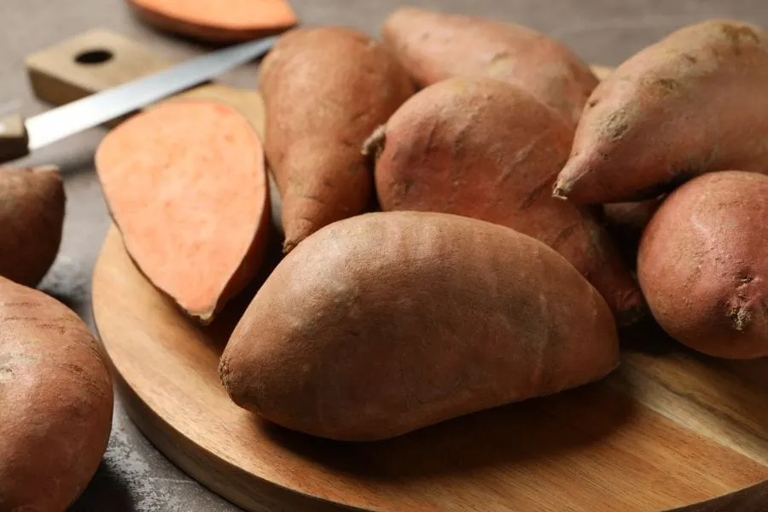When you cut into a sweet potato and it’s black on the inside, it’s not only unappetizing, it’s also a sign that the potato has gone bad. But why do sweet potatoes turn black? And is there anything you can do to prevent it?
There are a few reasons why sweet potatoes can turn black. One is that the potato is old and has started to rot. Another is that the potato was exposed to too much light. Finally, if the potato was stored in a humid environment, it can develop mold which can also cause the potato to turn black.
There are a few things you can do to prevent your sweet potatoes from turning black. First, make sure to buy fresh sweet potatoes. If you’re not going to use them right away, store them in a cool, dark place. And finally, don’t store them in a humid environment. If you do all of these things, your sweet potatoes should stay nice and fresh.
Physical Damage or Mold Spots
More importantly, how can you prevent it? When you slice into a sweet potato and it’s black inside, it’s not exactly the most appetizing sight. But why does this happen?

One is physical damage, such as bruising or cutting the potato too deeply. This damage exposes the inner flesh of the potato to oxygen, which causes it to turn black. There are a few reasons why sweet potatoes can turn black.
Mold can also cause sweet potatoes to turn black. Once the potato is cut open, the mold can spread to the inside of the potato and cause it to turn black. If they’re stored in a humid or damp environment, mold spores can start to grow on the surface of the potato.
First, be careful not to damage them when you’re handling them. Second, store them in a cool, dry place to prevent mold from growing. Fortunately, there are a few things you can do to prevent your sweet potatoes from turning black. With a little care, you can enjoy sweet potatoes that are perfectly safe to eat.
Mysterious Black Spots
This is due to a reaction between the oxygen and a compound in the sweet potatoes called anthocyanin. When sweet potatoes are exposed to oxygen, they will turn black. There are a few ways to prevent this from happening. While this blackening of the sweet potatoes is not harmful, it can make them less visually appealing.
So, What’s the Issue?
Well, it’s not the most appetizing sight. When you cut into a sweet potato and it’s black on the inside, it’s not necessarily bad. And, if you’re trying to make a dish that’s aesthetically pleasing, black sweet potatoes can ruin the look. In fact, it’s perfectly safe to eat. So, what’s the issue? Fortunately, there are a few things you can do to prevent your sweet potatoes from turning black.
How to Make Things Better
When you cook sweet potatoes, you may notice that they sometimes turn black. While blackened sweet potatoes are safe to eat, they may not be as tasty or attractive as their lighter counterparts. This is usually due to overcooking or exposure to oxygen.

Sweet potatoes should be cooked slowly over low heat to prevent them from overcooking. Finally, eat them soon after cooking to prevent them from turning black. First, cook them properly. Second, avoid exposure to oxygen by storing them in an airtight container. There are a few things you can do to prevent sweet potatoes from turning black.
Frequently Asked Questions
1. Why do sweet potatoes turn black?
There are a few reasons why sweet potatoes can turn black. One reason is if they are not cooked properly. When sweet potatoes are not cooked long enough, the sugars in them can turn black. Another reason is if they are stored in a humid or warm place. This can cause the sweet potatoes to rot and turn black.
2. How can I prevent my sweet potatoes from turning black?
There are a few things you can do to prevent your sweet potatoes from turning black. First, make sure you cook them properly. Sweet potatoes should be cooked until they are soft all the way through. Secondly, store them in a cool, dry place. This will help to prevent them from rotting.
3. What are some other ways to cook sweet potatoes?
There are many ways to cook sweet potatoes. You can bake them, fry them, or even boil them. Each method will result in a different taste and texture.
4. What are some other uses for sweet potatoes?
Sweet potatoes can be used in a variety of recipes. They can be used as a side dish, in soups or stews, or even as a main course. Sweet potatoes are also a popular ingredient in many desserts.
5. What are the nutritional benefits of sweet potatoes?
Sweet potatoes are a good source of vitamins and minerals. They are also a good source of fiber. Sweet potatoes can help to improve your overall health and well-being.
Final thoughts
When cooked, sweet potatoes contain a high amount of anthocyanins. These pigments are what give sweet potatoes their characteristic orange color. However, when sweet potatoes are exposed to oxygen, the anthocyanins oxidize and turn the sweet potatoes black. There are a few ways to prevent this from happening. First, cook the sweet potatoes in a covered container so that they are not exposed to oxygen. Second, add an acidic ingredient to the cooking water, such as lemon juice, which will help to keep the sweet potatoes from turning black. Finally, store cooked sweet potatoes in an airtight container in the refrigerator.
